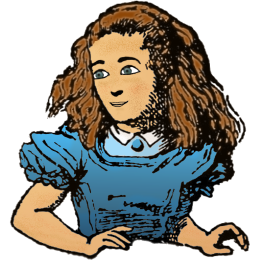Media Literacy
Comprehensive websites ...
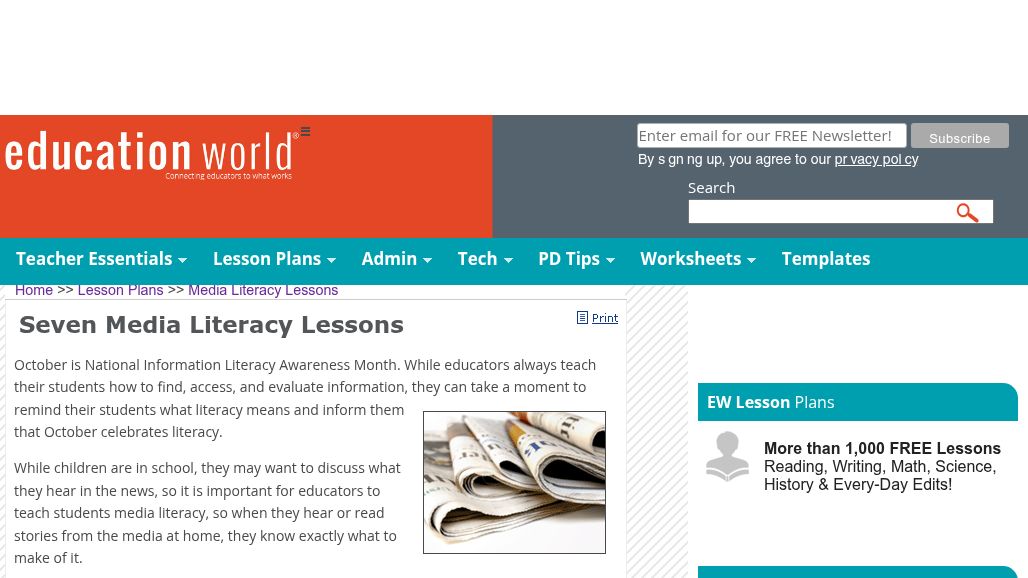
Seven Media Literacy Lessons
October is National Information Literacy Awareness Month. While educators always teach their students how to find, access, and evaluate information, they can take a moment to remind their… learn more
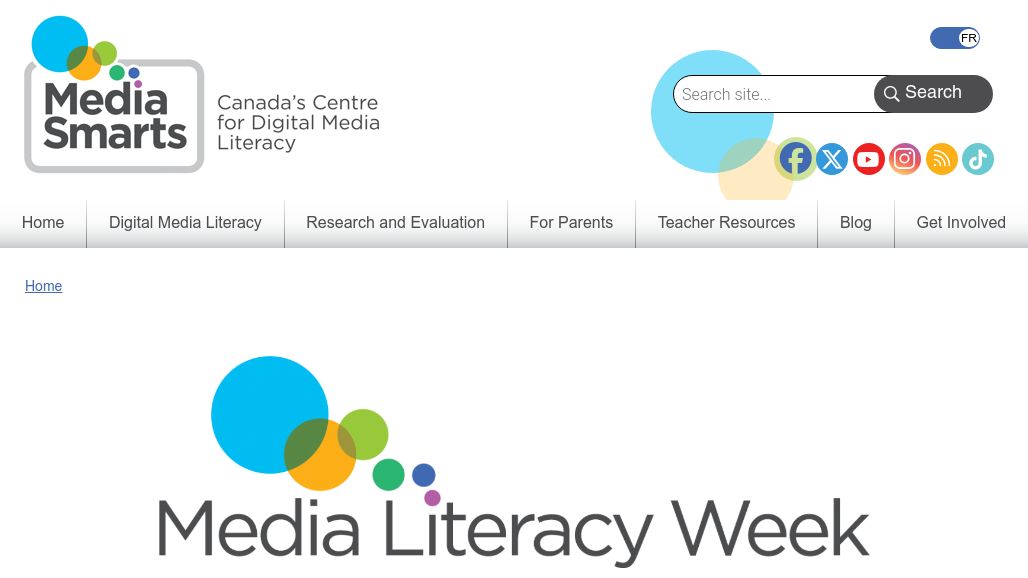
Media Literacy Week Teachers’ Hub
This space is designed to provide you with lessons and resources for you to use during Media Literacy Week, brought to you by MediaSmarts and supported by the… learn more
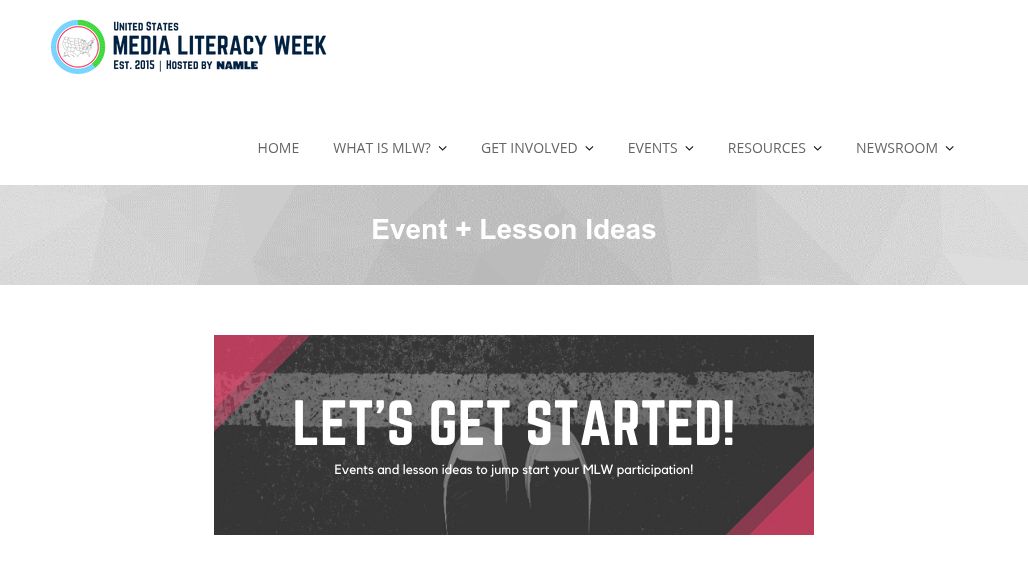
Media Literacy Week: Event + Lesson Ideas
Need Event or Classroom Lesson Ideas? Elementary Resources This list of resources design specifically for K-5 educators, librarians, and community practitioners provides a sampling of past events that… learn more
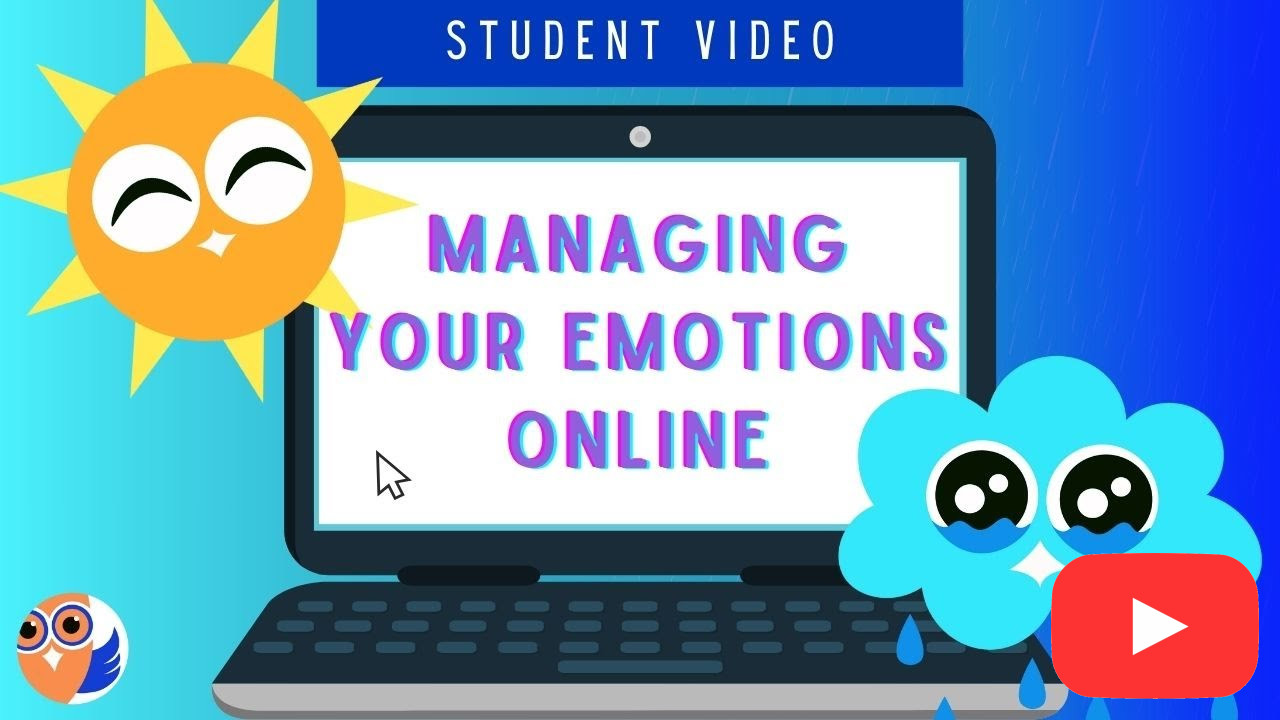
Managing Your Emotions Online Lesson From Digital On-Ramps Cyber Civics 4th and 5th Grade Curriculum
Are you ready to explore the exciting world of managing emotions online? Join us in our latest video, "Managing Your Emotions Online," as we dive into the digital… learn more
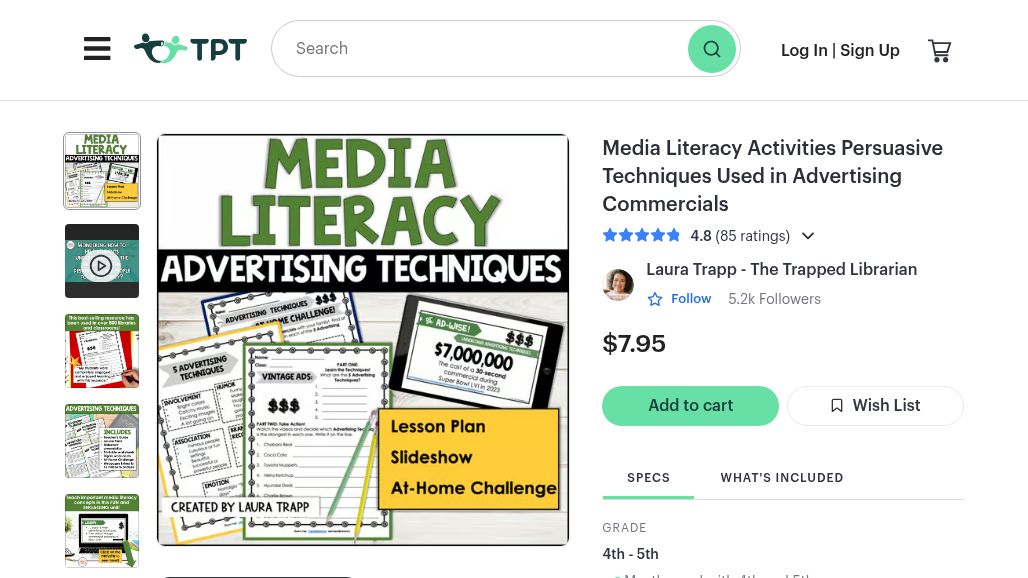
Media Literacy Advertising Techniques
TPT. Teach important media literacy concepts as your students learn about advertising techniques in this engaging unit. Commercials from the Big Game are always popular, so use that football… learn more
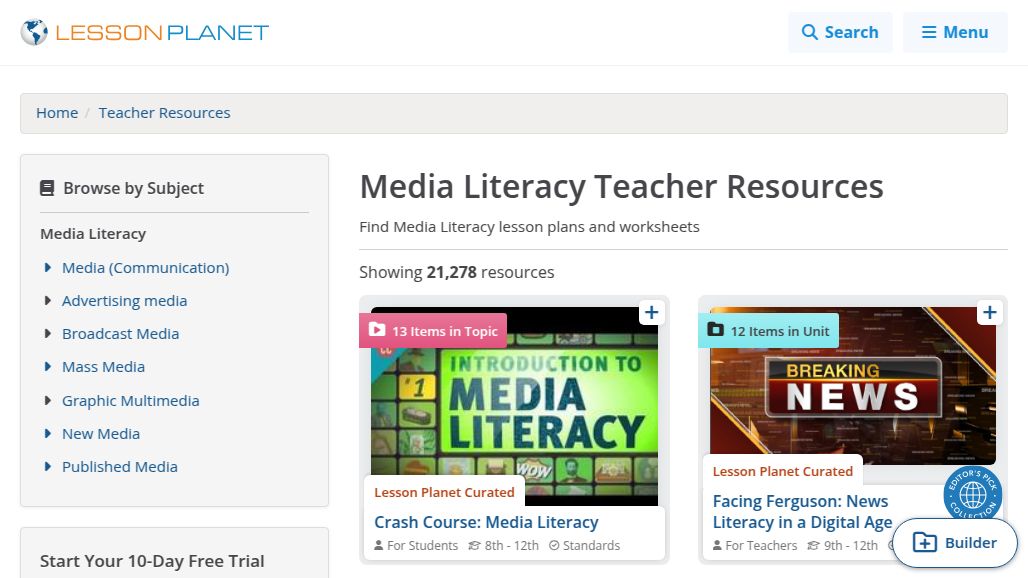
Lesson Planet: Media Literacy Teacher Resources
Founded by educators for educators, Lesson Planet is passionate about creating and delivering innovative digital tools and quality educational resources to help personalize student learning and inspire great… learn more
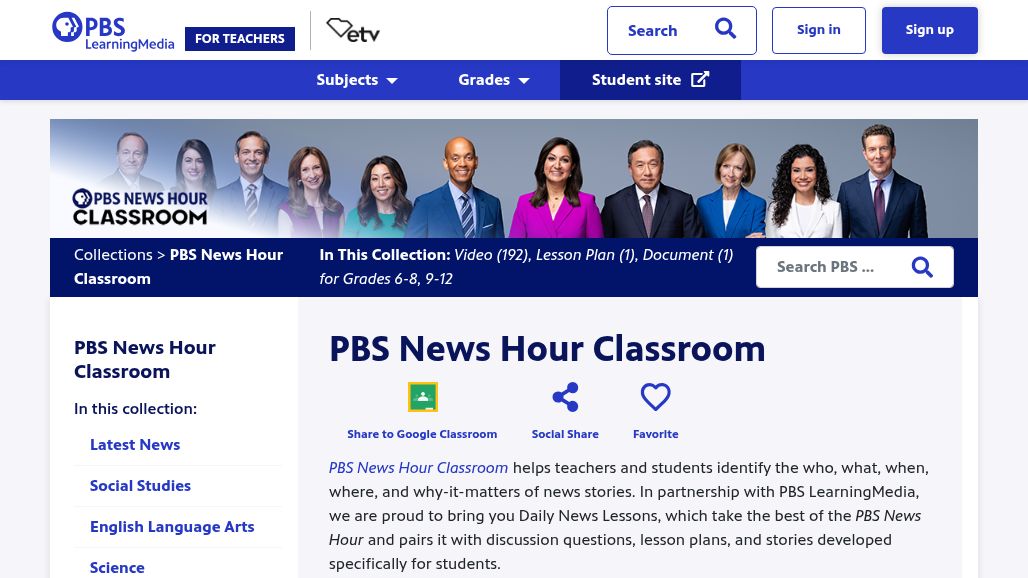
PBS NewsHour Classroom
PBS NewsHour Classroom (formerly NewsHour Extra) helps teachers and students identify the who, what, when, where, and why-it-matters of news stories. Classroom features daily news lessons based on PBS NewsHour, full-length video-based lesson… learn more
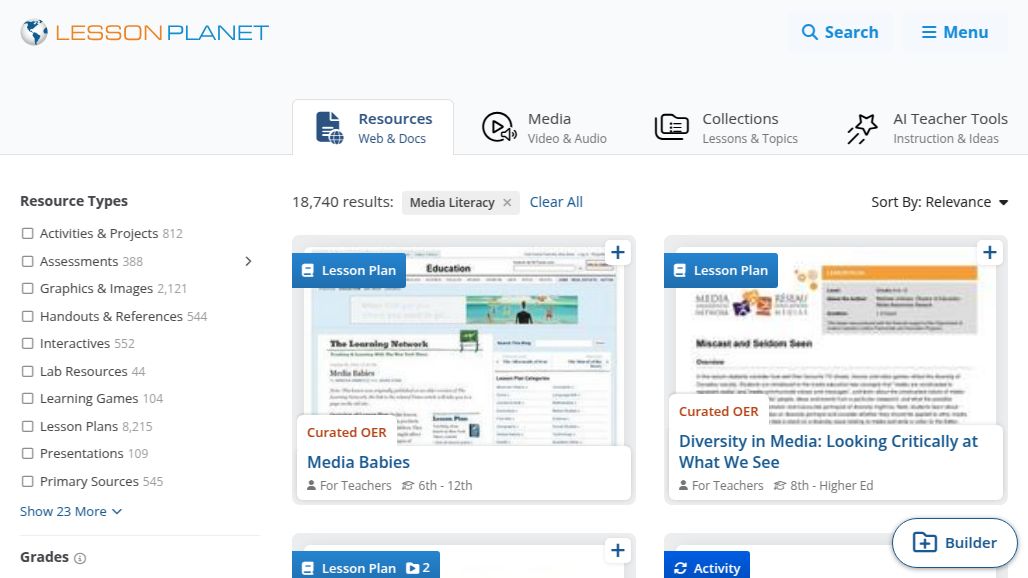
Lesson Planet: Media Literacy
Create engaging lessons with 2.5 million vetted educational resources--videos, interactives, games, lesson ideas, and more. learn more
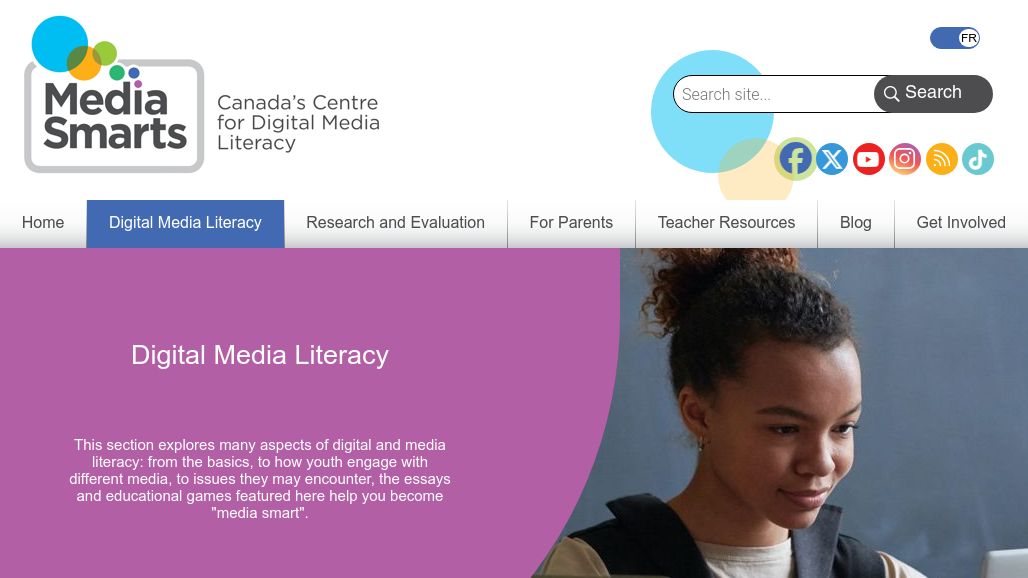
Media Smarts: Digital Media Literacy
This section explores many aspects of digital and media literacy: from the basics, to how youth engage with different media, to issues they may encounter, the essays and… learn more
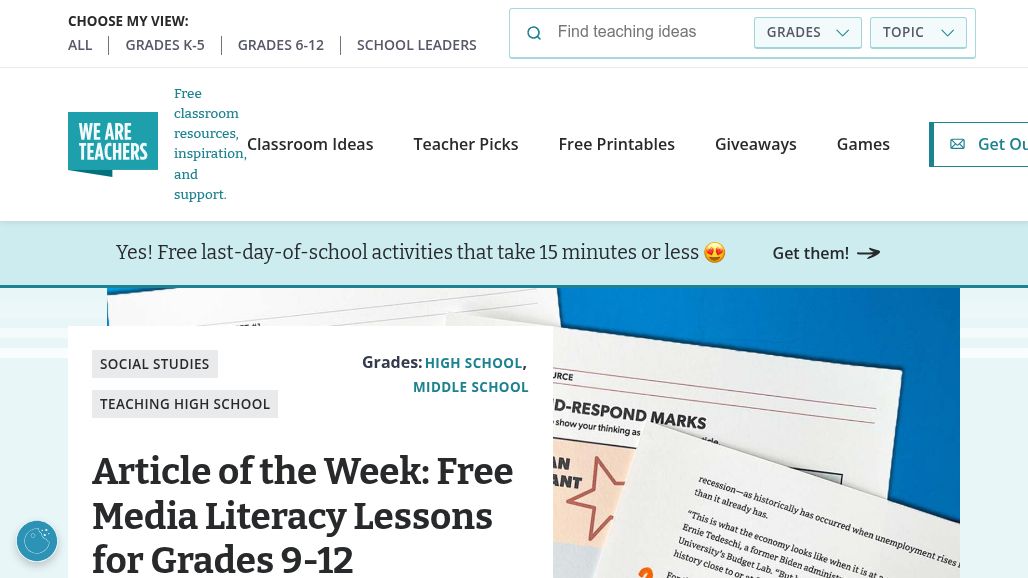
Article of the Week: Free Media Literacy Lessons for Grades 9-12
Young people are finding it increasingly challenging to recognize real information vs. fake. The need to be media literate has never been more important. But finding the time… learn more
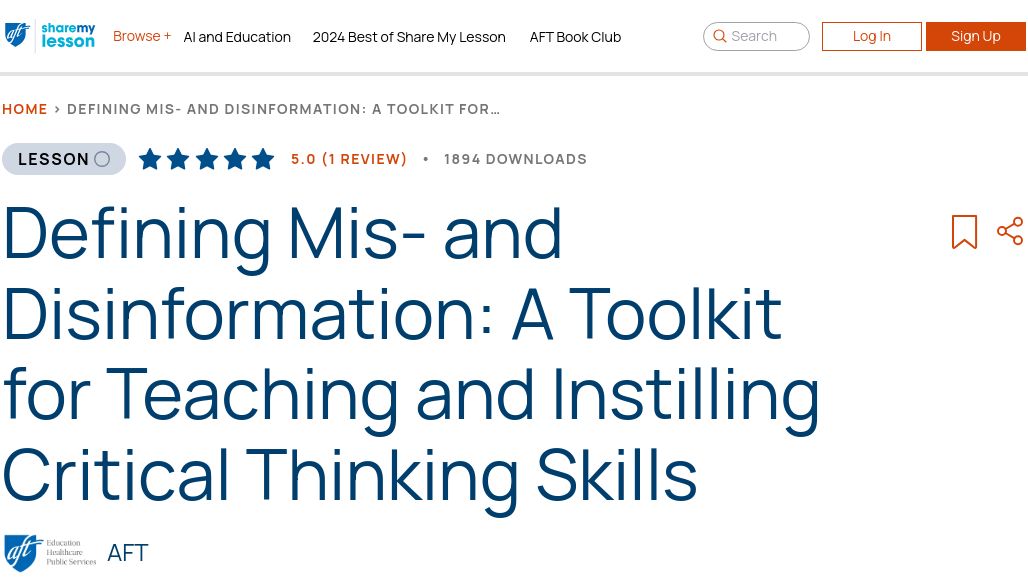
Defining Mis- and Disinformation: A Toolkit for Teaching & Instilling Critical Thinking Skills
Today, with technology making information more accessible than ever before, we are facing a challenge. This surge of disinformation, often fueled by malicious entities aiming to harm individuals,… learn more
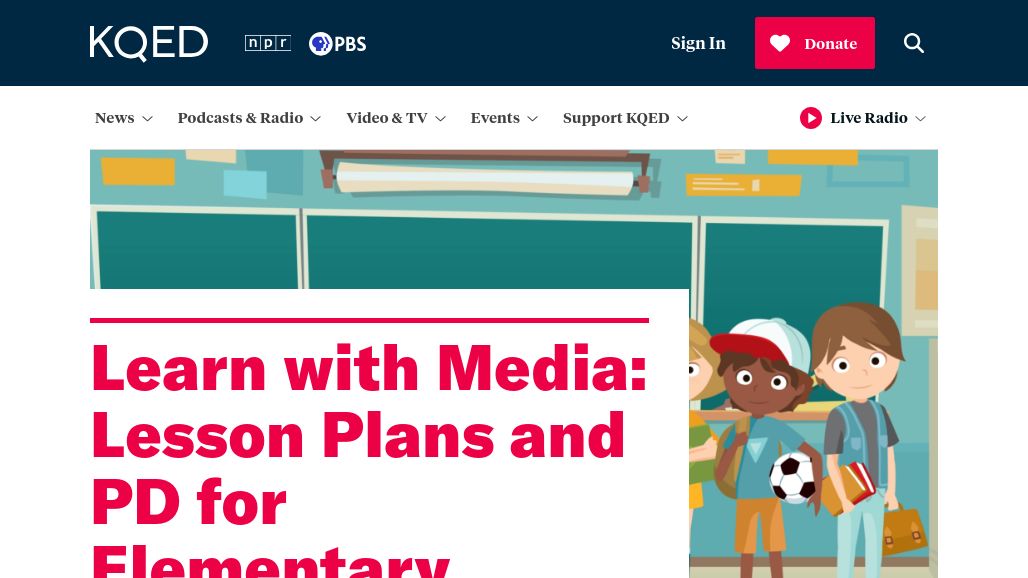
Learn with Media: Lesson Plans and PD for Elementary
Lesson plans and resources aligned to Common Core State Standards (CCSS) and ISTE standards, and geared toward early childhood through upper elementary. Gain the confidence to create digital… learn more
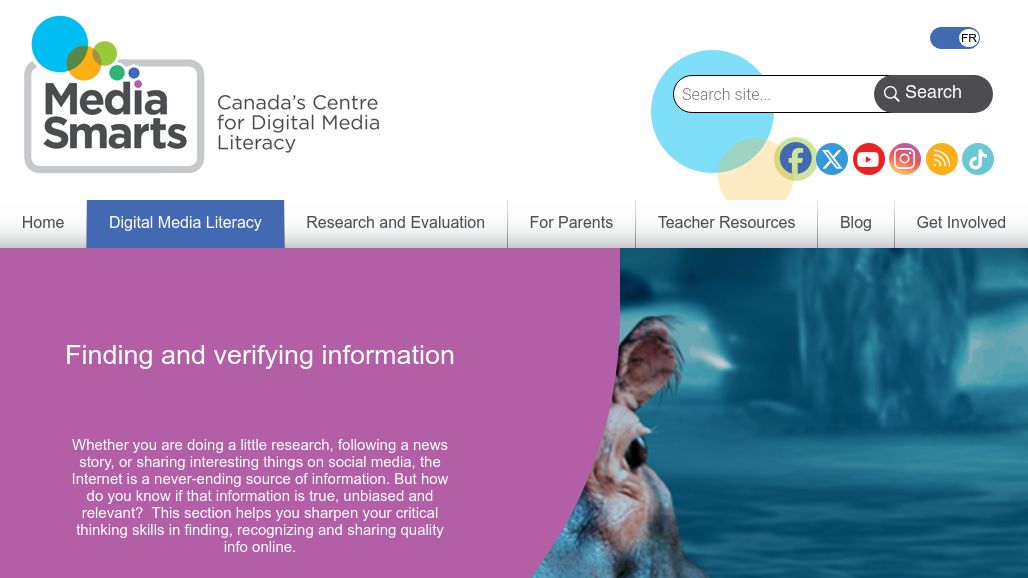
MediaSmarts: Authenticating Information
Whether you are doing a little research, following a news story, or sharing interesting things on social media, the Internet is a never-ending source of information. But how… learn more
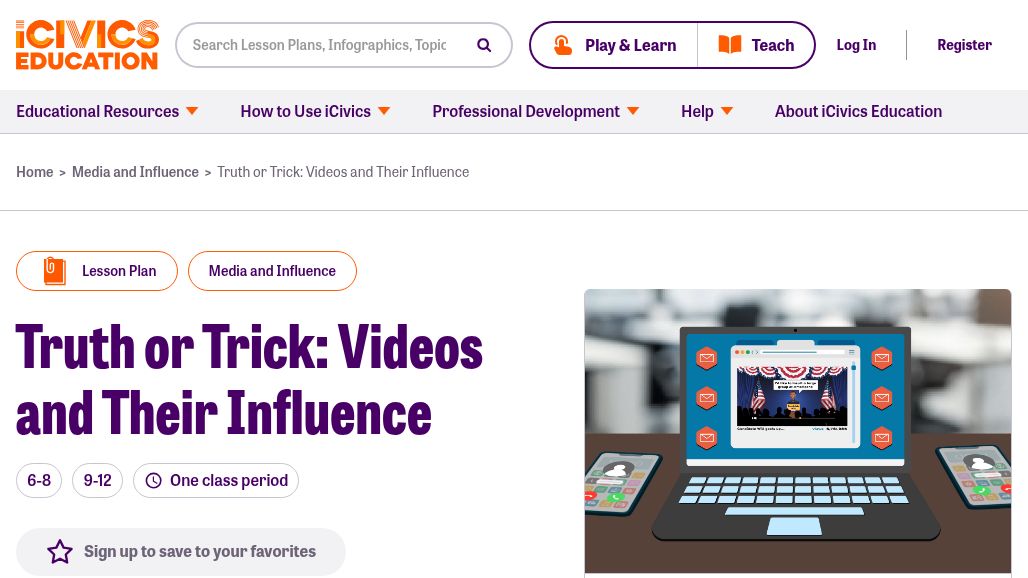
Truth or Trick: Videos and Their Influence
Videos have a way of grabbing your attention, but have you ever considered who's behind the video and why they might be posting it? In this lesson, students… learn more
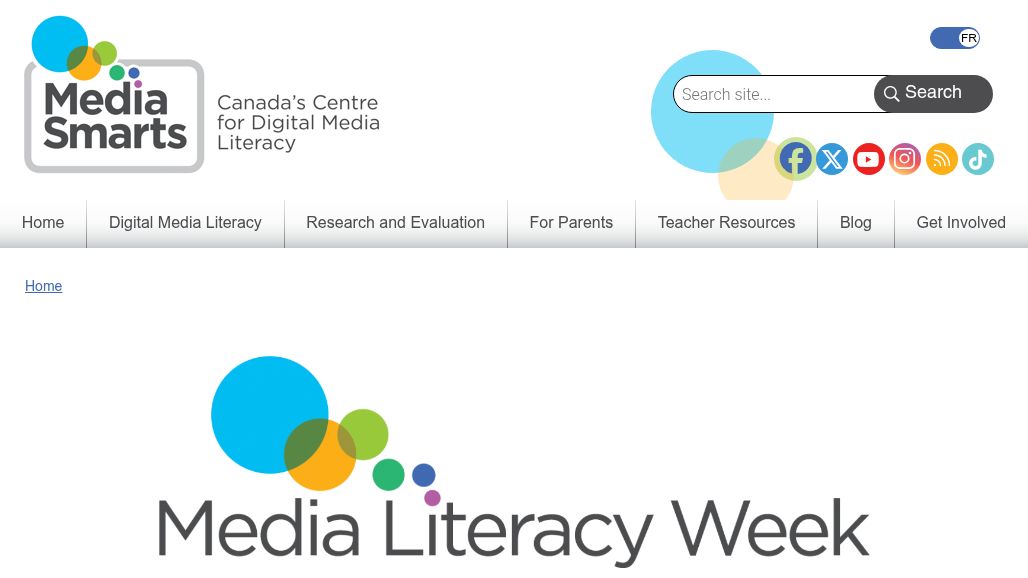
Media Literacy Week: Digital Citizen Day
What is Digital Citizen Day? Digital Citizen Dayis an annual event encouraging everyone to engage and share responsibly in our digital world. If you’re online, you’re a digital… learn more
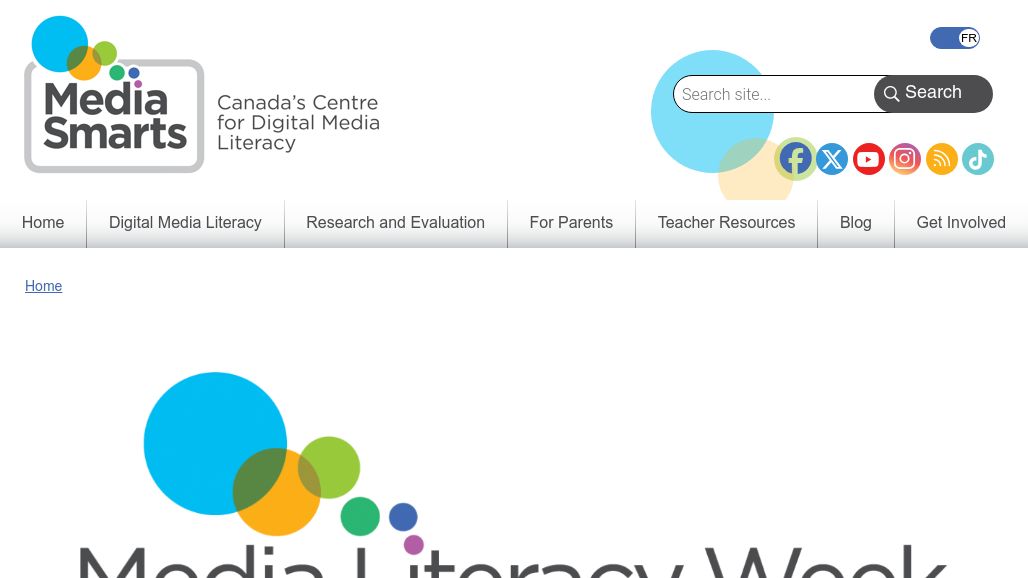
Media Literacy Week Themes
Celebrate each day of Media Literacy Week by highlighting aspects of digital media literacy - use, understand, engage, access - and putting a special focus on skills to verify online information. On… learn more
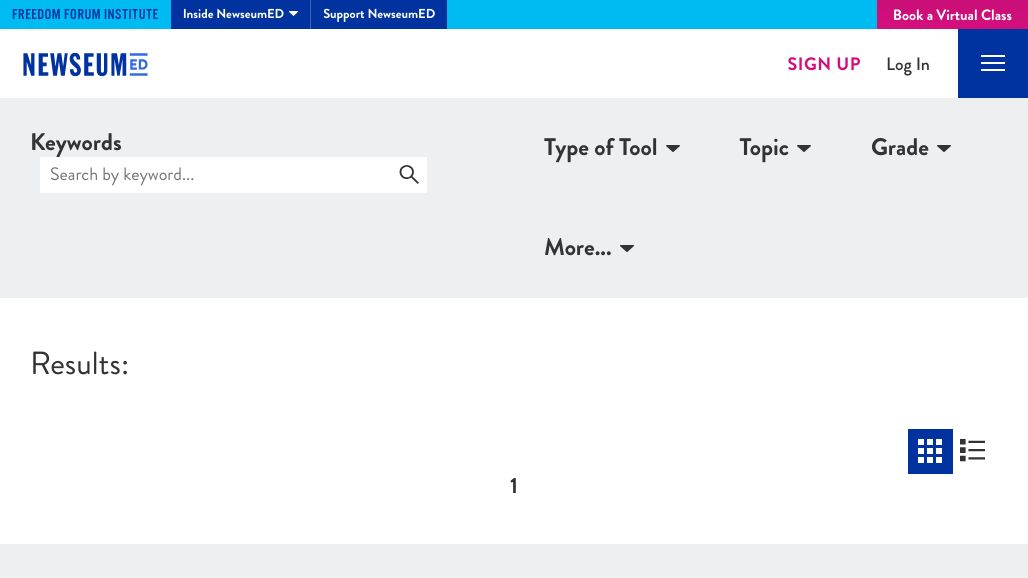
NewsuemED Lesson Plans
NewseumED.org offers free resources to cultivate the First Amendment and media literacy skills essential to civic life. Learn how to authenticate, analyze and evaluate information from a variety… learn more
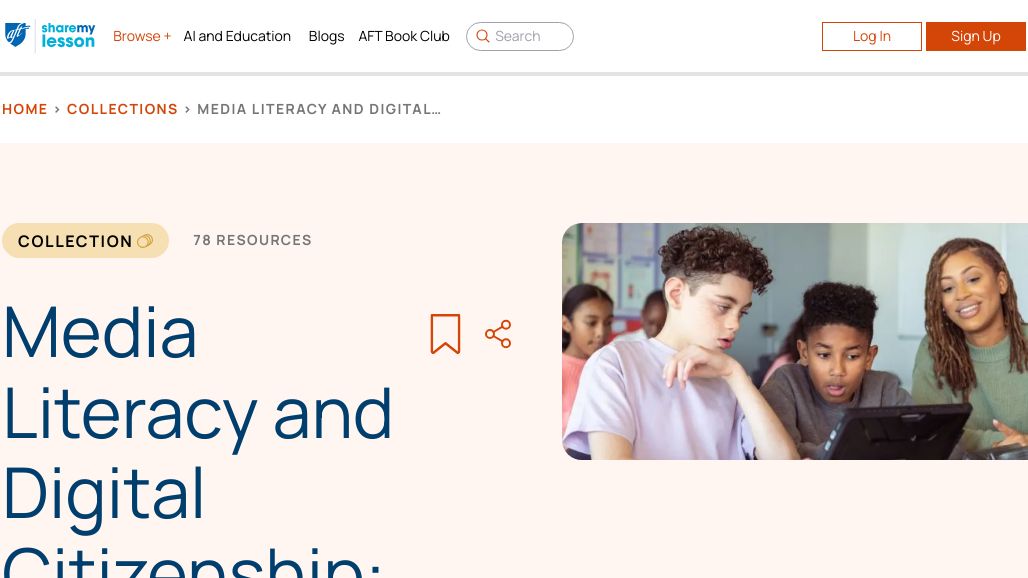
Media Literacy and Digital Citizenship: Lesson Plans and Resources
In our digital age, it’s important that we teach our students the ins and outs of media literacy. That’s why we’ve put together this collection of resources for… learn more
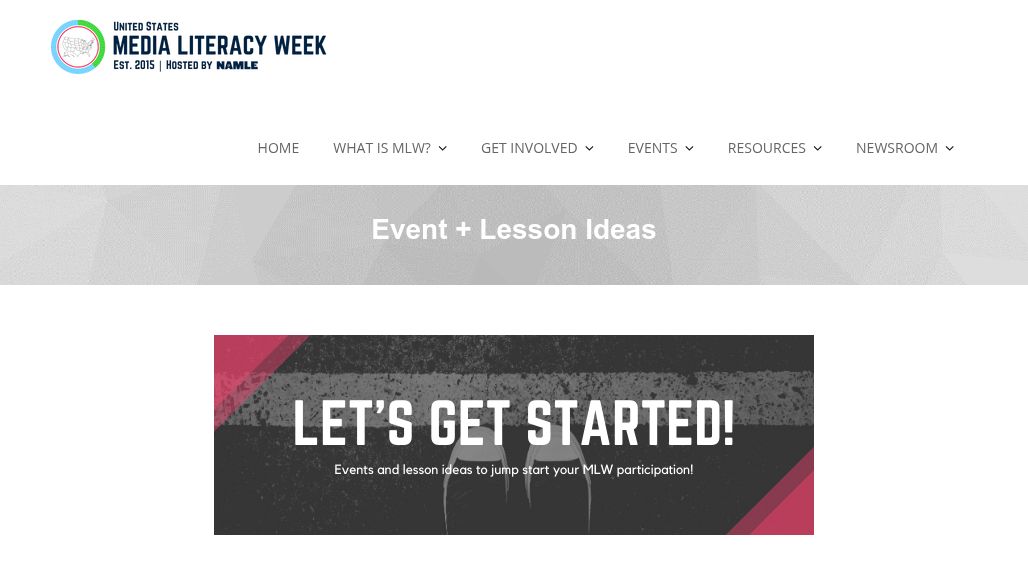
US Media Literacy Week: Classroom Lesson Ideas
The mission of Media Literacy Week is to highlight the power of media literacy education and its essential role in education all across the country. U.S. Media Literacy… learn more
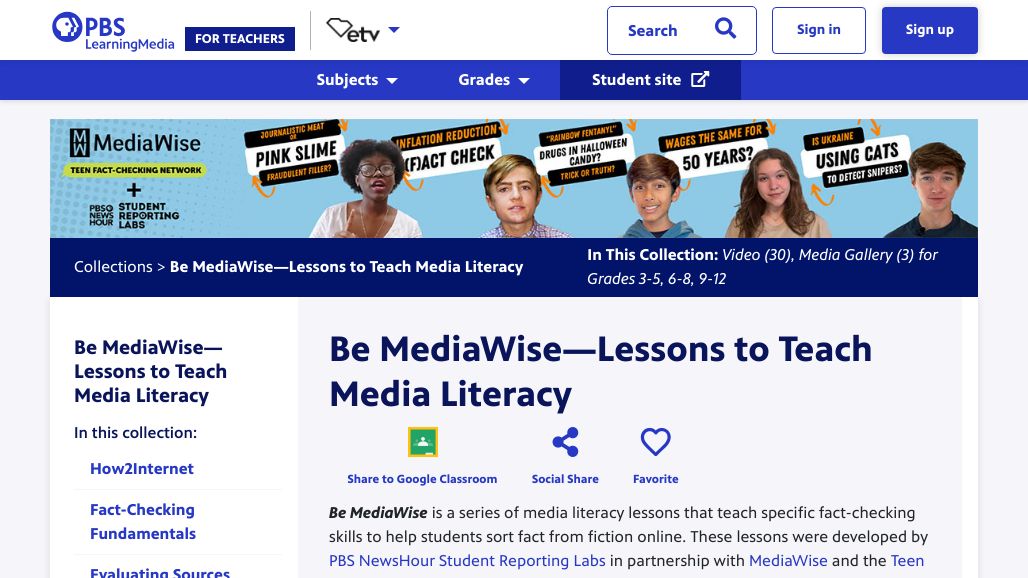
Be MediaWise—Lessons to Teach Media Literacy
Be MediaWise is a series of media literacy lessons that teach specific fact-checking skills to help students sort fact from fiction online. PBS NewsHour Student Reporting Labs developed… learn more
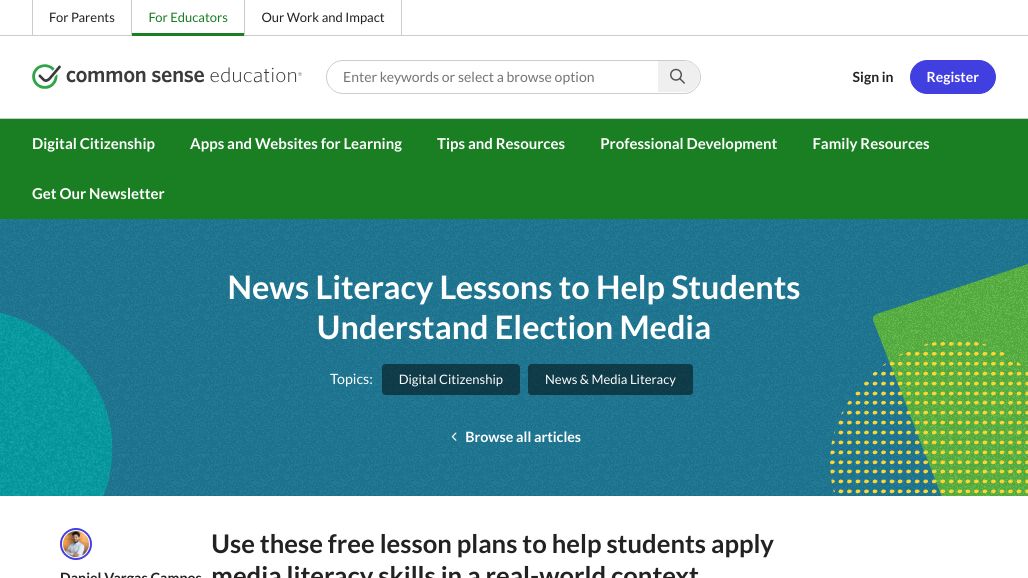
Common Sense: News Literacy Lessons to Help Students Understand Election Media
Use these free lesson plans to help students apply media literacy skills in a real-world context. Politics and elections come with a confusing media landscape. But elections, and the… learn more
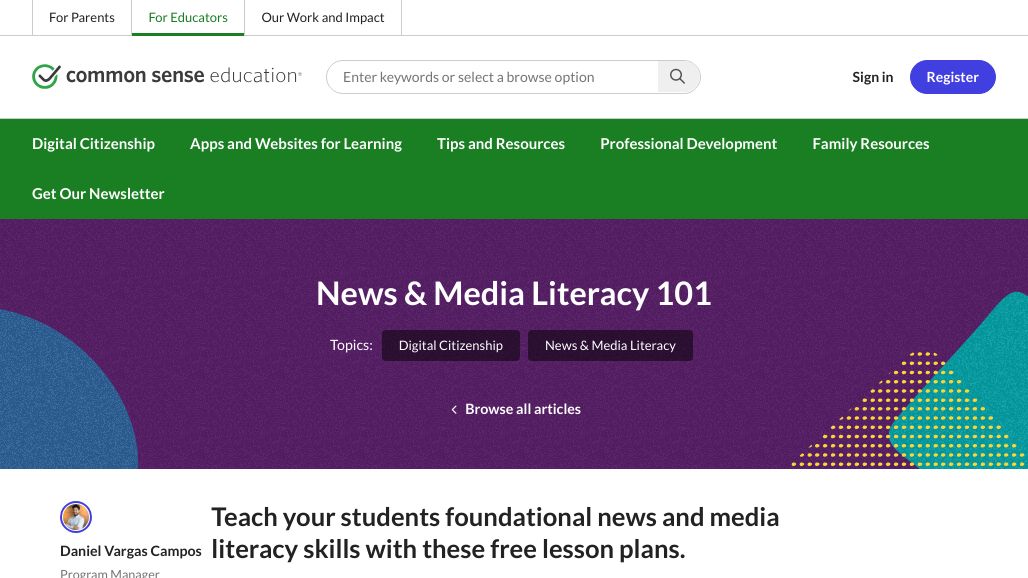
Common Sense: News & Media Literacy 101
Teach students foundational news and media literacy skills with these free lesson plans. To help students build a strong foundation of news and media literacy, use these free,… learn more
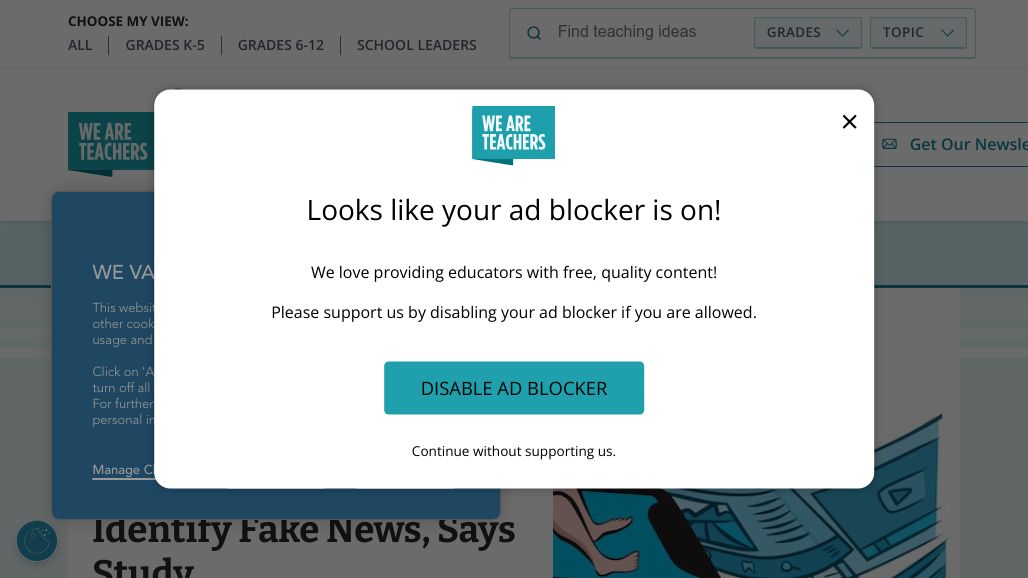
Today’s Students Can’t Identify Fake News
In today’s environment, media literacy is more important than ever. But the sparse research on the topic shows us that kids really struggle with identifying legitimate sources. This Stanford… learn more

Media Literacy for the Digital Era
Understanding and interpreting media is more important than ever in a world of endless content streams, platforms, screen time, and generative AI. Yet, not all students have the… learn more

Are Kids Anxious or Unprepared? The State of Digital and Media Literacy Education
There’s increasing concern about rising anxiety levels among youth, and technology often gets the blame. As we navigate a world where technology is an integral part of life,… learn more
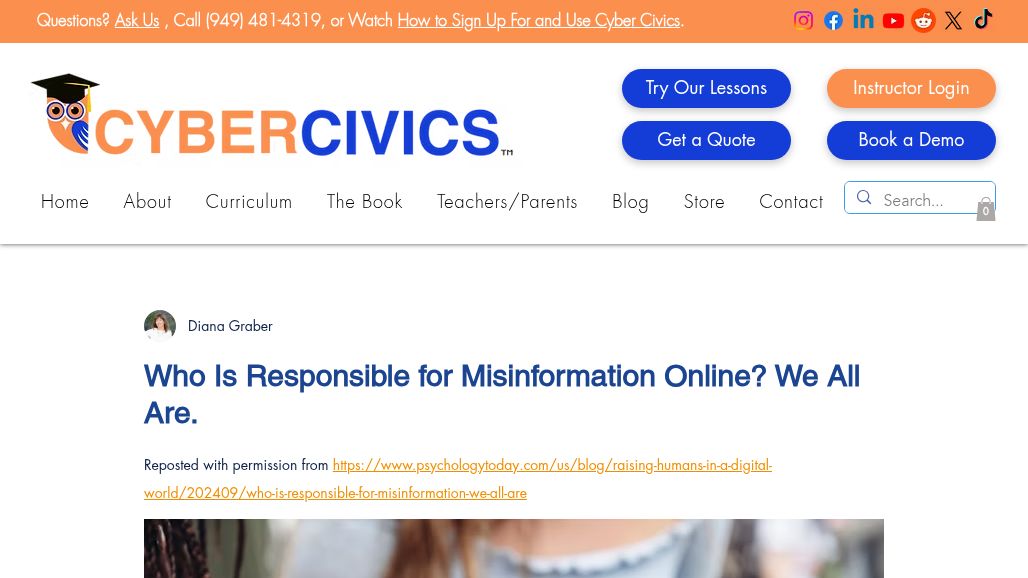
Who Is Responsible for Misinformation Online? We All Are.
In 2019, three MIT researchers discovered that false news spreads more rapidly on social media than real news, by a substantial margin, because internet users like and share it with others.… learn more
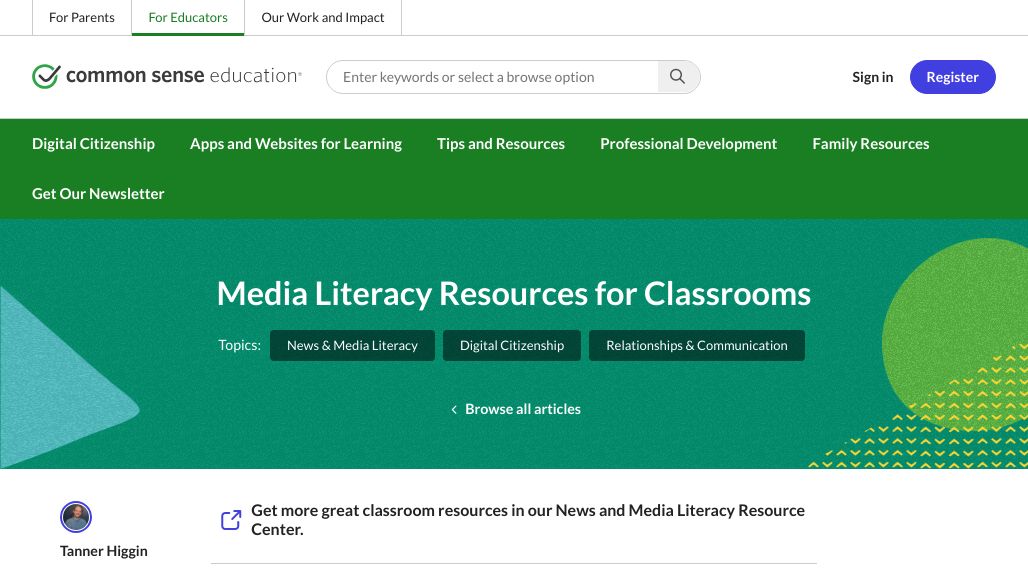
Media Literacy Resources for Classrooms
A best-of-the-best collection of resources for teaching and learning about media literacy. In this collection, you'll find hand-picked, regularly updated resources to help you better understand and practice… learn more
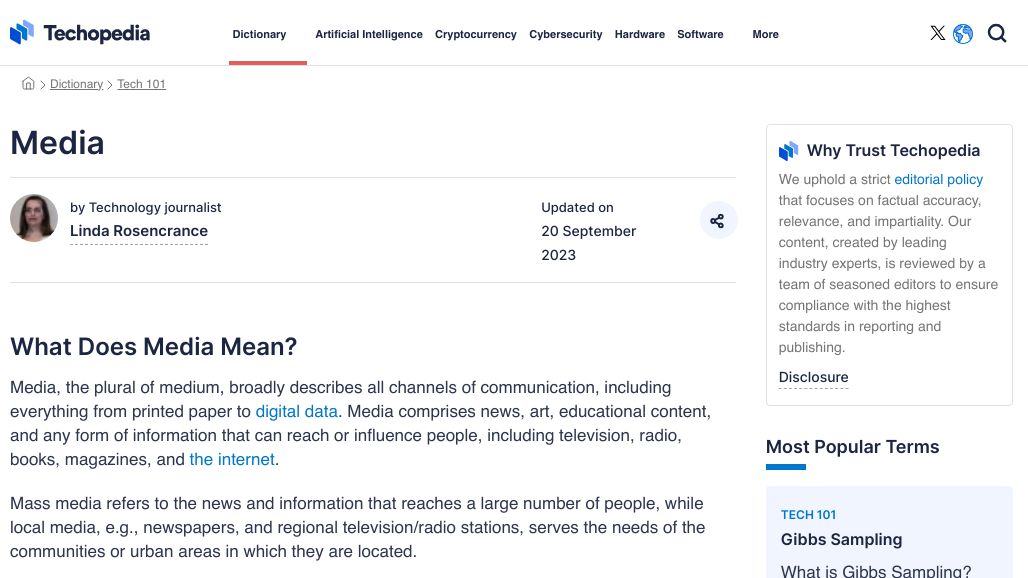
What Does Media Mean?
Media is the plural form of medium, which (broadly speaking) describes any channel of communication. This can include anything from printed paper to digital data, and encompasses art, news,… learn more
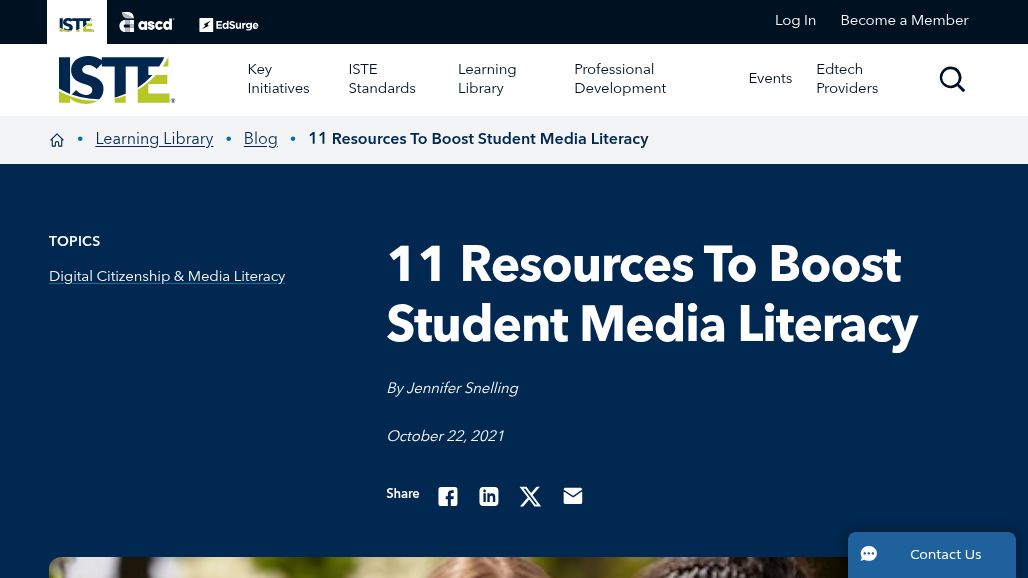
11 Resources To Boost Student Media Literacy
Whether it’s recognizing fake news, media bias or just information overload, media literacy has never been more important. Reading carefully and thinking critically have always been the basic… learn more
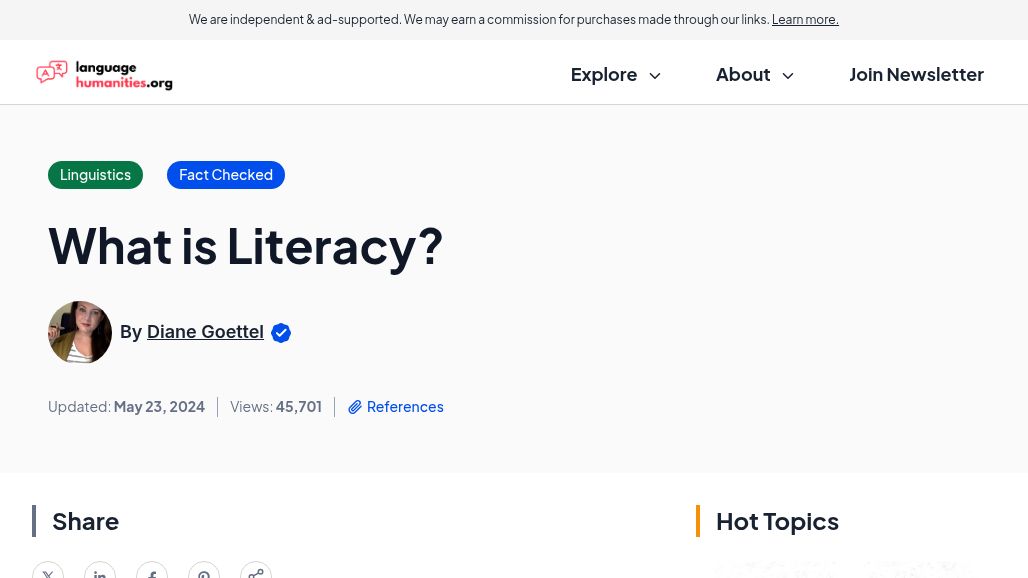
What Is Media Literacy?
Media literacy refers to the ability to understand and use all forms of modern media. Types of media include written sources such as newspapers and magazines, visual sources such as… learn more
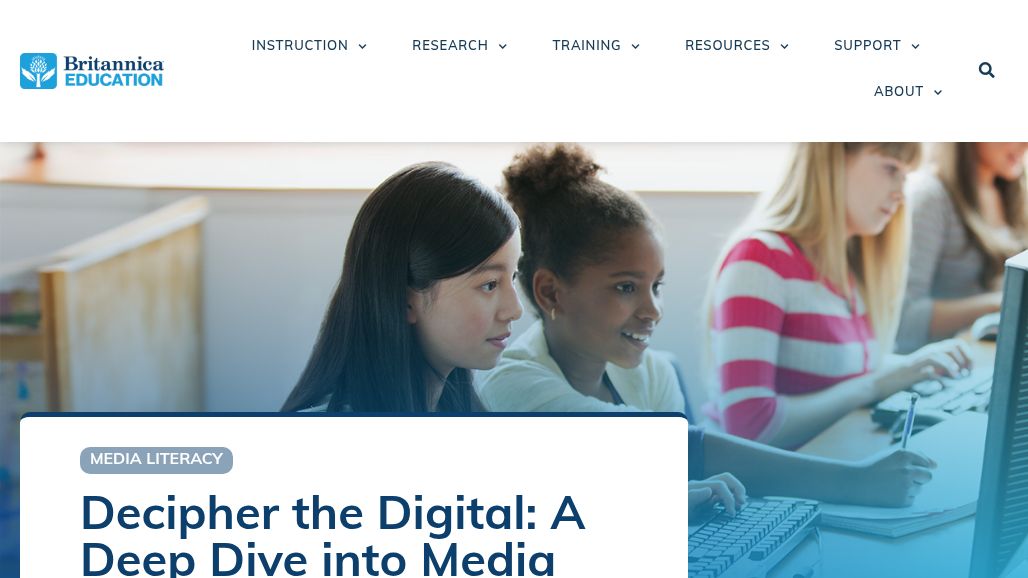
Decipher the Digital: A Deep Dive into Media Literacy Terminology
Have you ever questioned your media savviness in an era of infinite information? Do you understand the difference between misinformation and disinformation? What is your grasp on generative… learn more
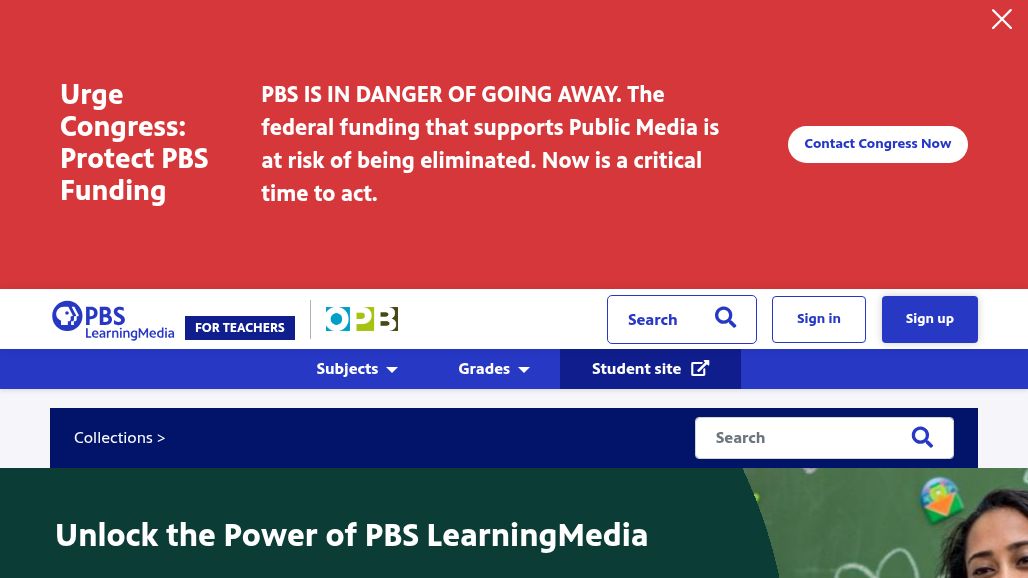
PBS LearningMedia: Media & Tech -Above the Noise
Above the Noise, a YouTube series for teens, cuts through the hype and dives deep into the research behind the issues affecting their daily lives. Every other week,… learn more
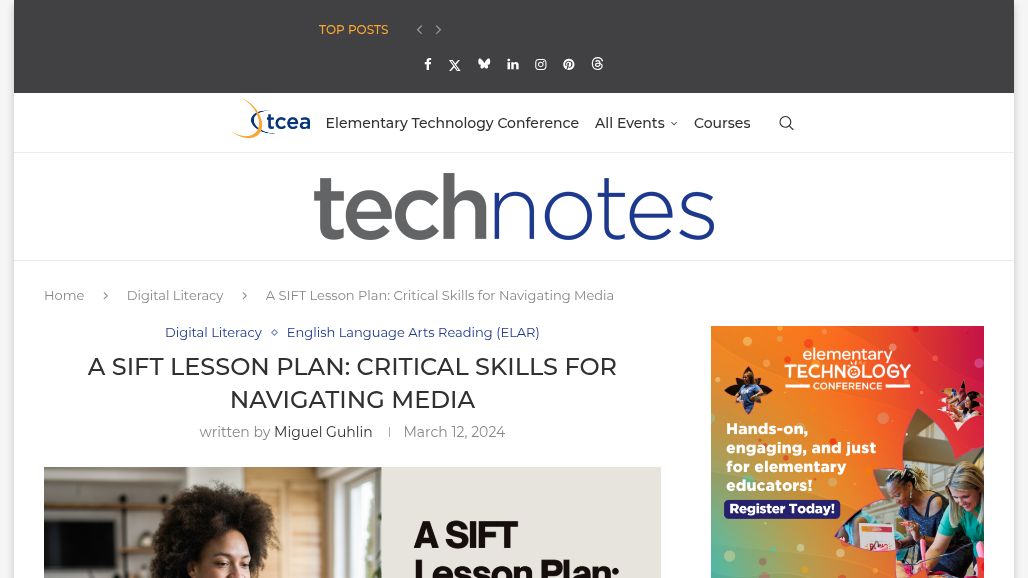
A SIFT LESSON PLAN: CRITICAL SKILLS FOR NAVIGATING MEDIA
“Oh my goodness, have you seen all the political ads on the television recently?” said a colleague earlier this month. It’s an election year, but how are you… learn more
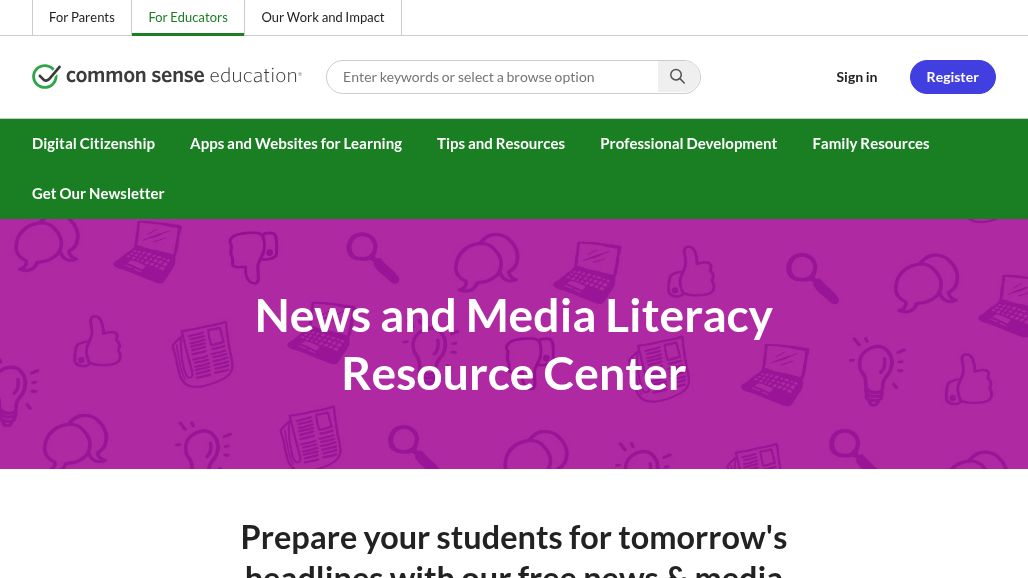
News and Media Literacy Resource Center
Prepare your students for tomorrow's headlines with our free news & media literacy activities and inquiry-based lessons. From viral trends to breaking news on social media, students must… learn more
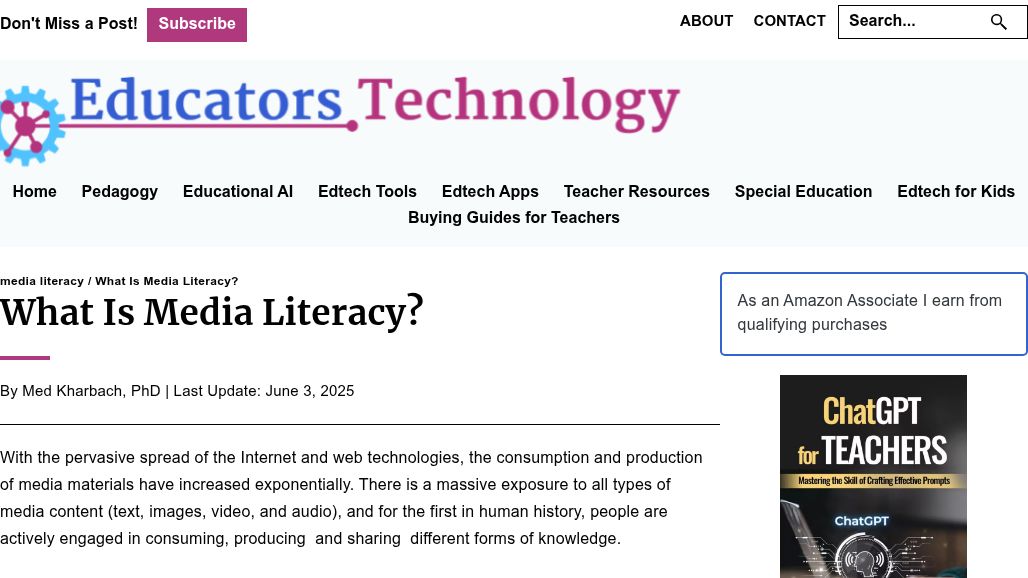
Educators Technology: What Is Media Literacy?
With the pervasive spread of the Internet and web technologies, the consumption and production of media materials have increased exponentially. There is a massive exposure to all types… learn more
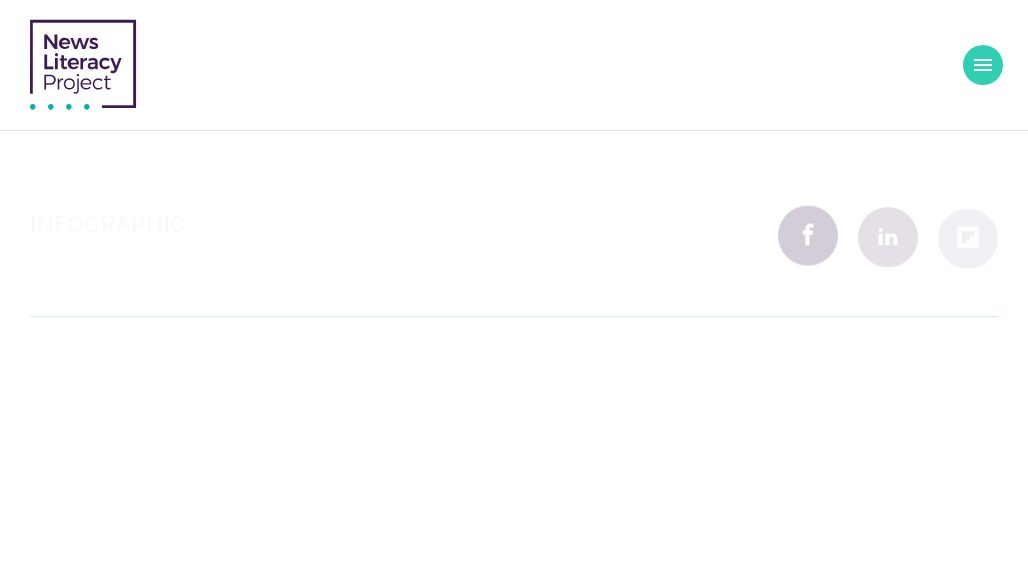
Breaking News Checklist
When big news breaks, it can be hard to cut through the noise and find accurate information. Misinformation thrives during times of war, natural disasters and upheaval —… learn more
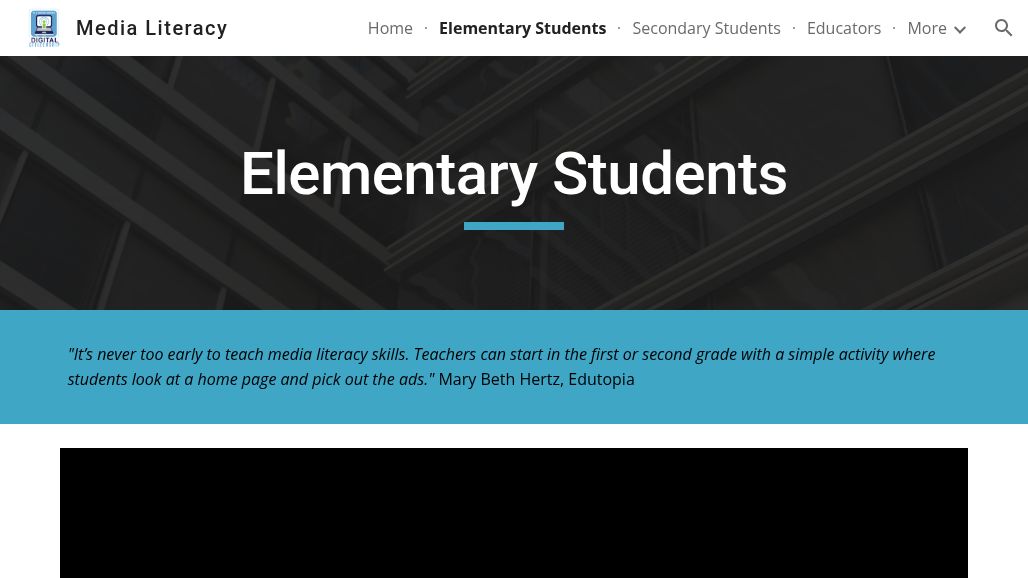
Media Literacy: Elementary Students
A collection of websites, videos, and activities to do with elementary students. "It’s never too early to teach media literacy skills. Teachers can start in the first or… learn more
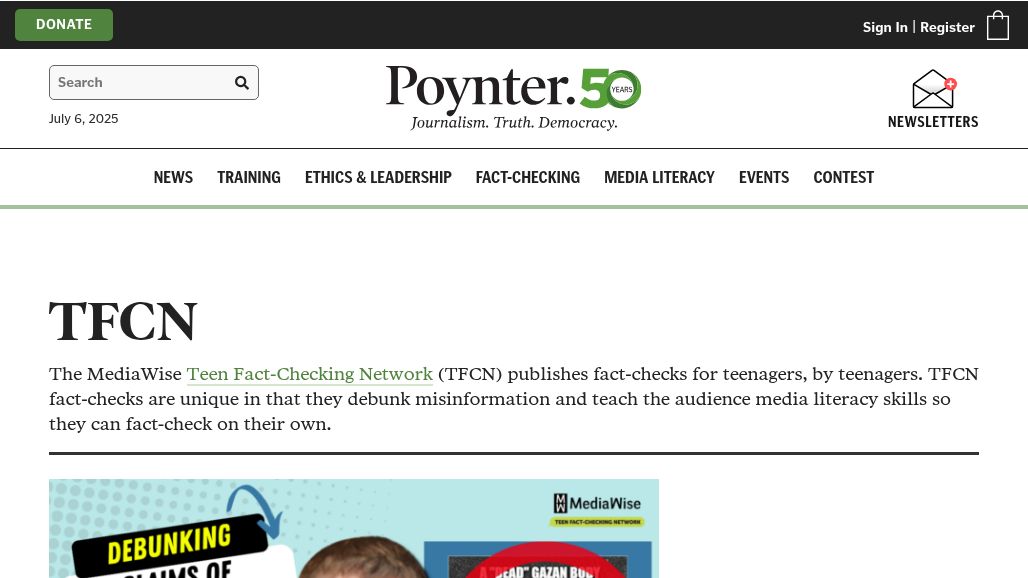
Teen Fact-Checking Network (TFCN)
The MediaWise Teen Fact-Checking Network (TFCN) publishes fact-checks for teenagers, by teenagers. TFCN fact-checks are unique in that they debunk misinformation and teach the audience media literacy skills so they… learn more
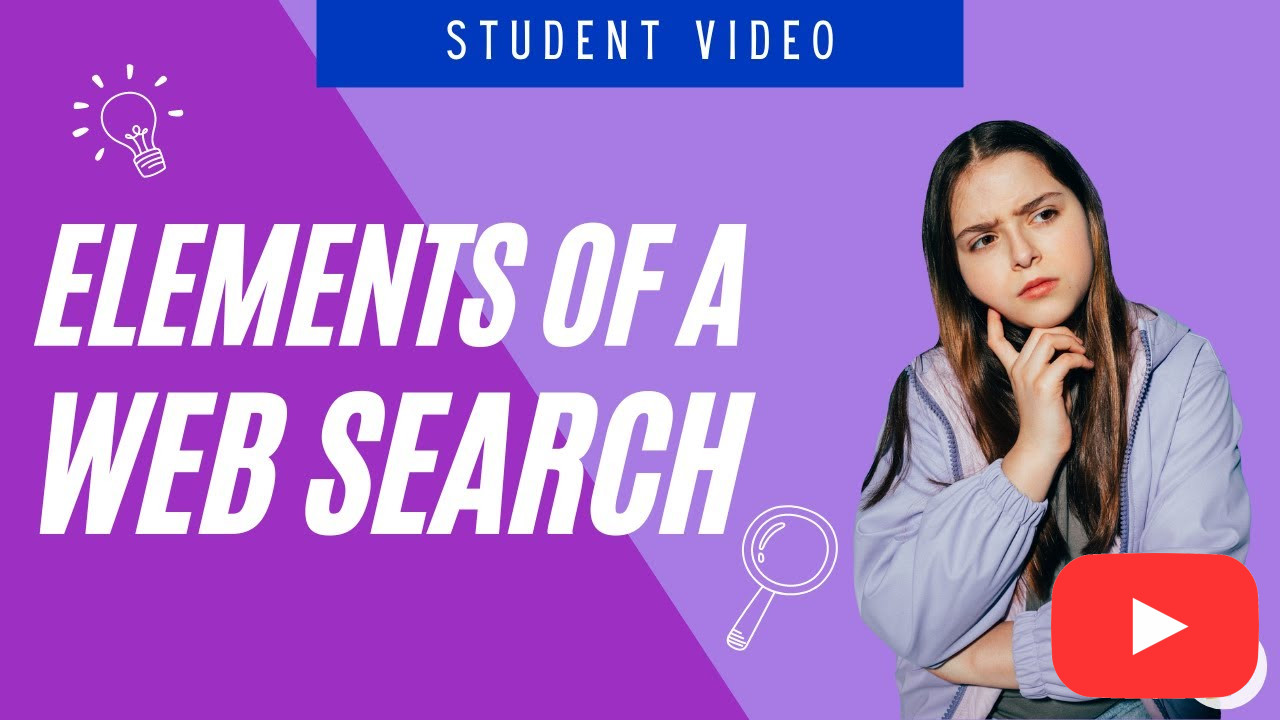
YouTube: Elements of a Web Search
Understanding how to effectively search the Internet is an essential “information literacy” skill. Although students use the Internet to search for things all the time, very few will… learn more
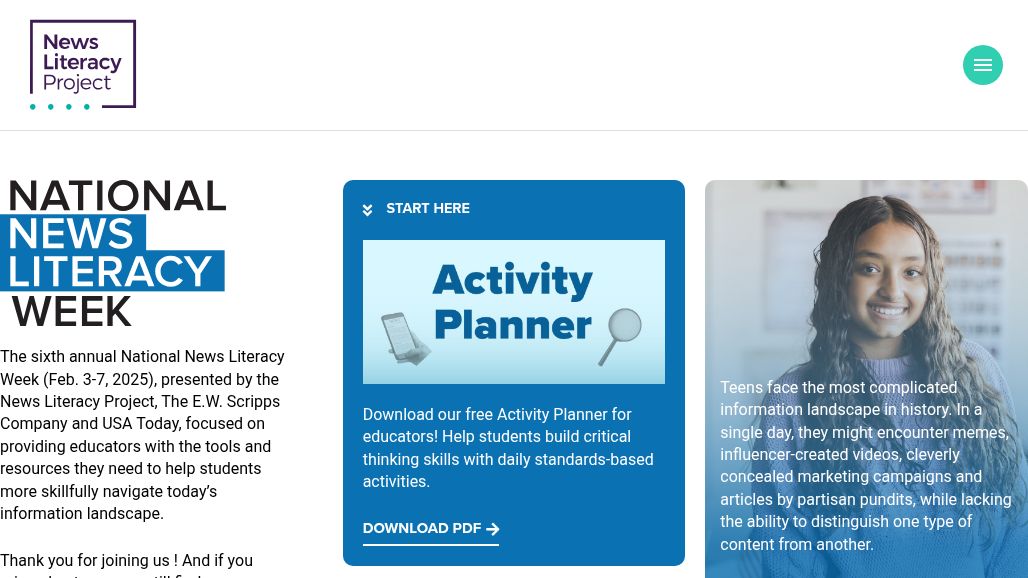
National News Literacy
Just 26% of Americans say they trust most news most of the time. Americans' trust in the media to report the news "fully, accurately and fairly" has been hovering at historic… learn more
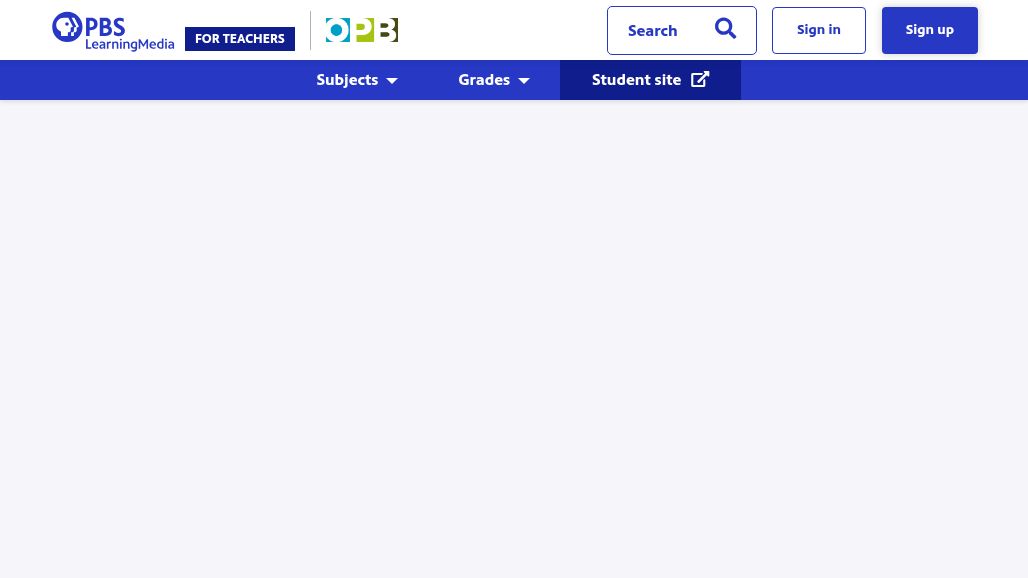
The Good, the Bad, and the Ugly Facts about Wikipedia | Be MediaWise
Wikipedia has articles about every topic—from "Taylor Swift" to "toast sandwich"—and chances are that one of the open-source online encyclopedia’s 6.6 million articles will appear at the top… learn more
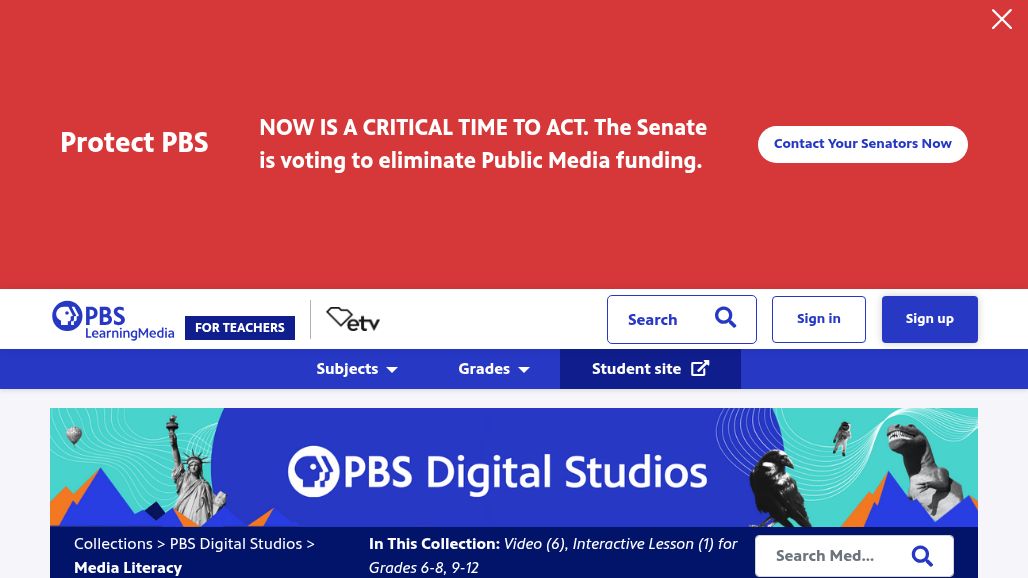
PBS Digital Studio: Media Literacy
PBS Digital Studios is a network that connects, inspires, and cultivates the next generation of public media enthusiasts by creating thought-provoking programs that illuminate the world around us.… learn more
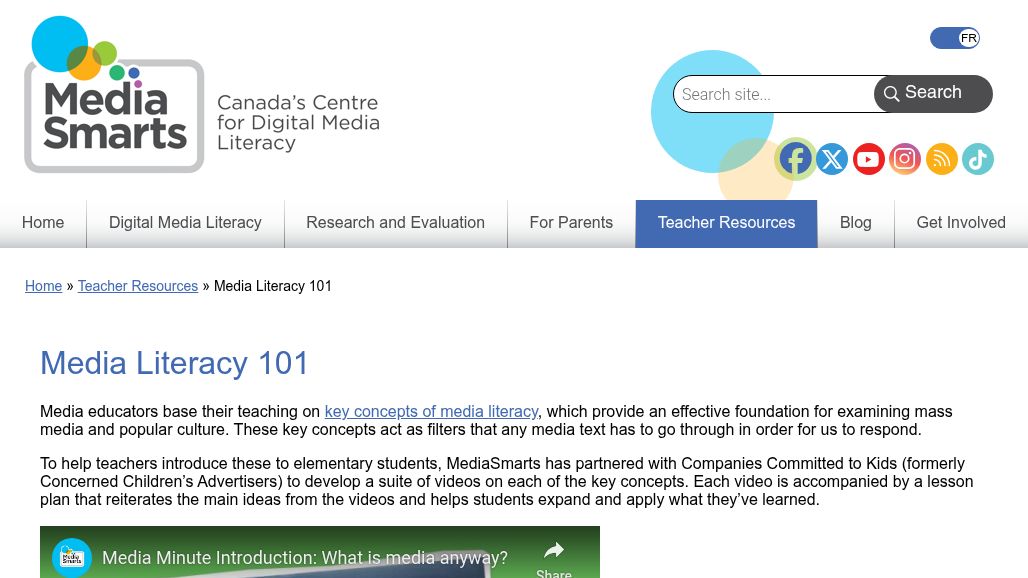
MediaSmarts: Media Literacy 101
Media educators base their teaching on key concepts of media literacy, which provide an effective foundation for examining mass media and popular culture. These key concepts act as filters… learn more
Resources for Teaching Media Literacy
Here is a curated collection of the classroom resources on media literacy that can be found at CivicsRenewalNetwork.org. Check back as more resources are added to the list. learn more
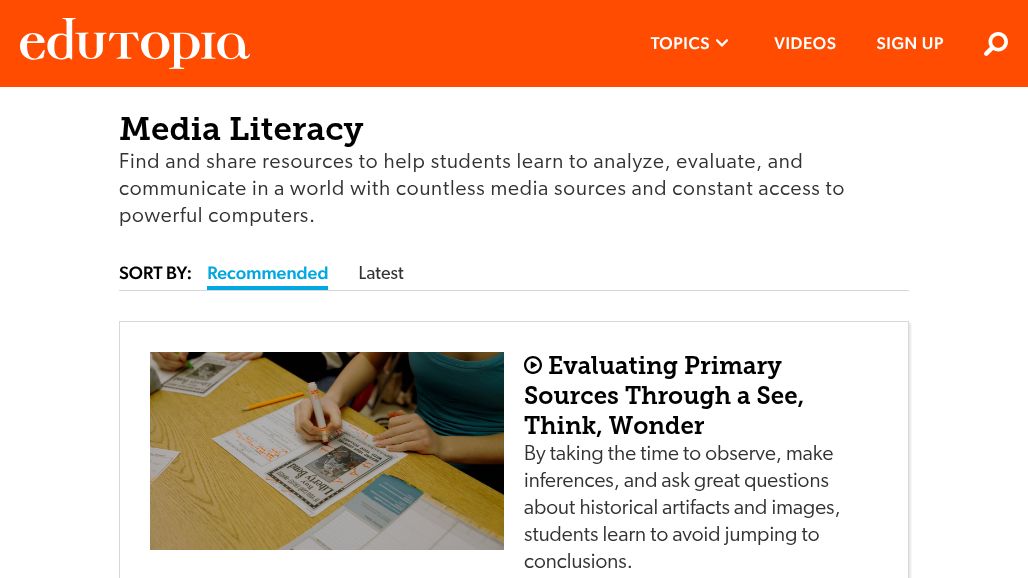
Edutopia: Media Literacy
Find and share resources to help students learn to analyze, evaluate, and communicate in a world with countless media sources and constant access to powerful computers. learn more
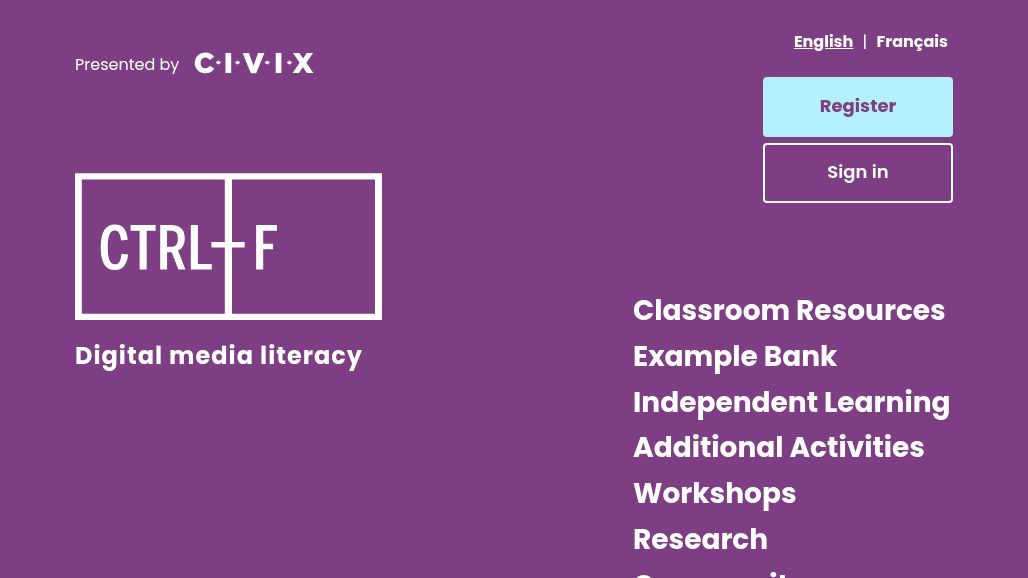
CTRL-F: Find the Facts
Digital Media Literacy. False and misleading information is rampant online, and people lack the skills and motivation to determine what to trust. To build the next generation of… learn more
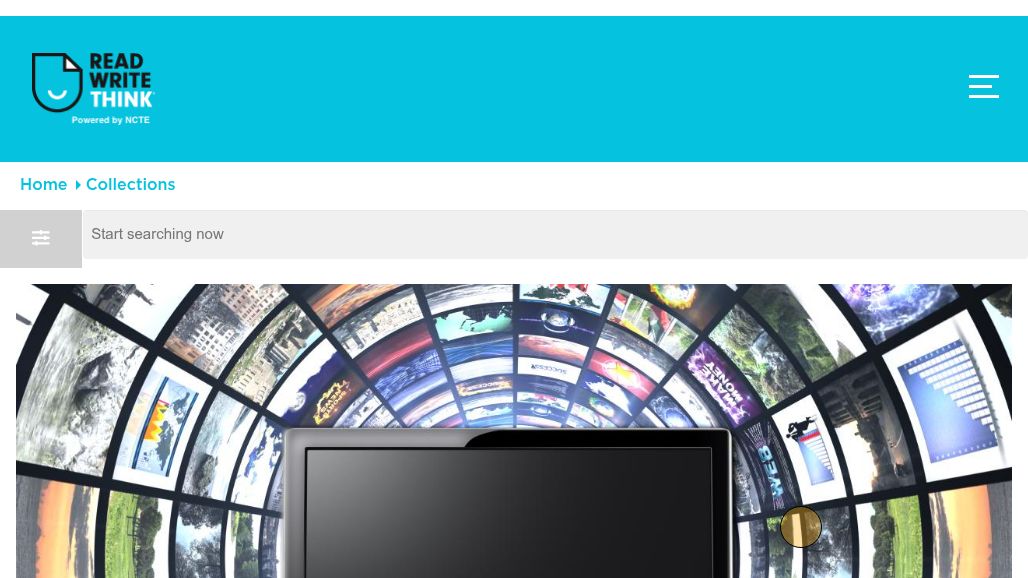
Read Write Think: Media Literacy Lesson Plans
Here at ReadWriteThink, our mission is to provide educators, parents, and afterschool professionals with access to the highest quality practices in reading and language arts instruction by offering… learn more
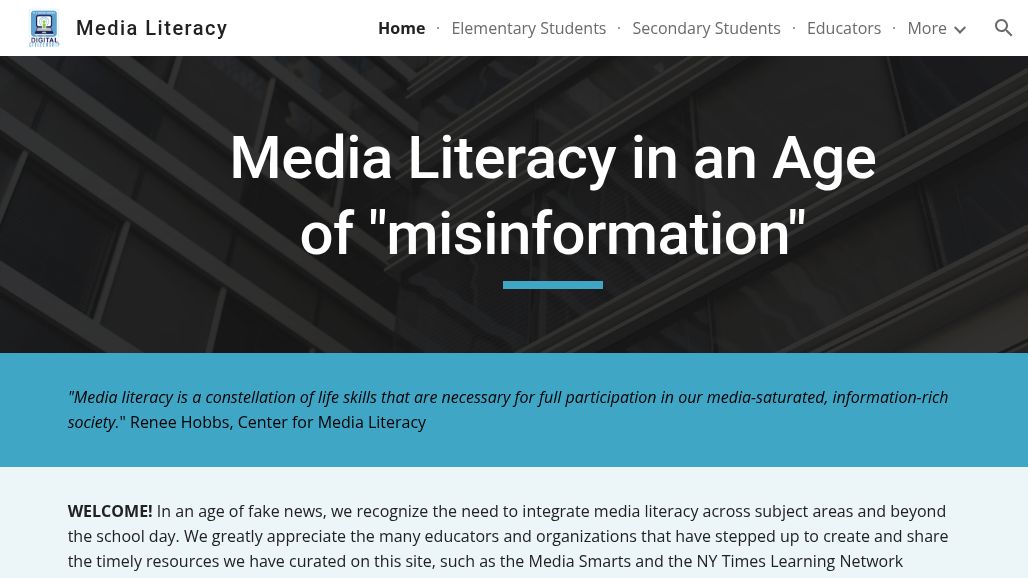
Media Literacy
In an age of fake news, we recognize the need to integrate media literacy across subject areas and beyond the school day. We greatly appreciate the many educators… learn more
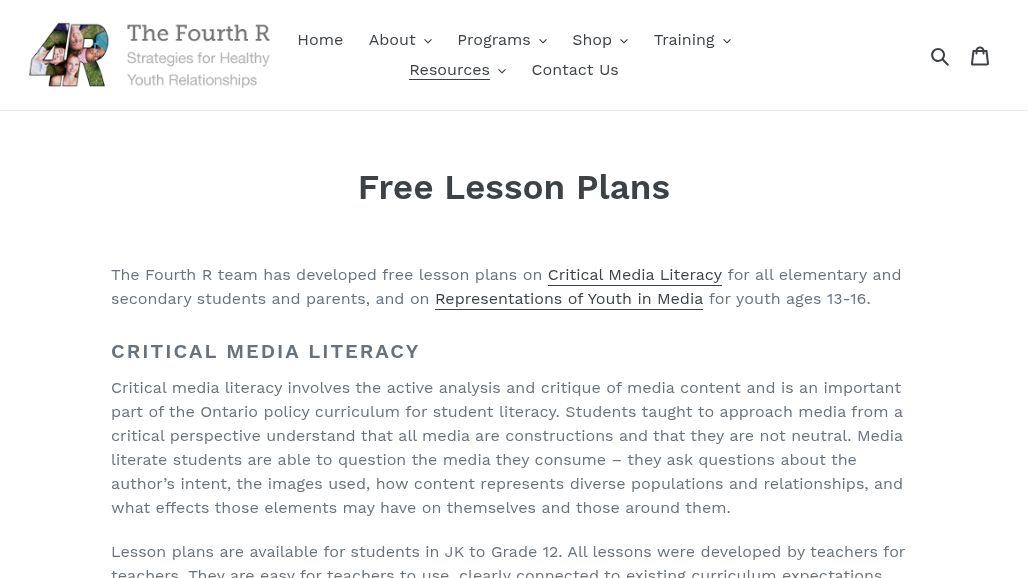
Critical Media Literacy
The Fourth R team has developed free lesson plans on Critical Media Literacy for all elementary and secondary students and parents and on Representations of Youth in Media for youth… learn more
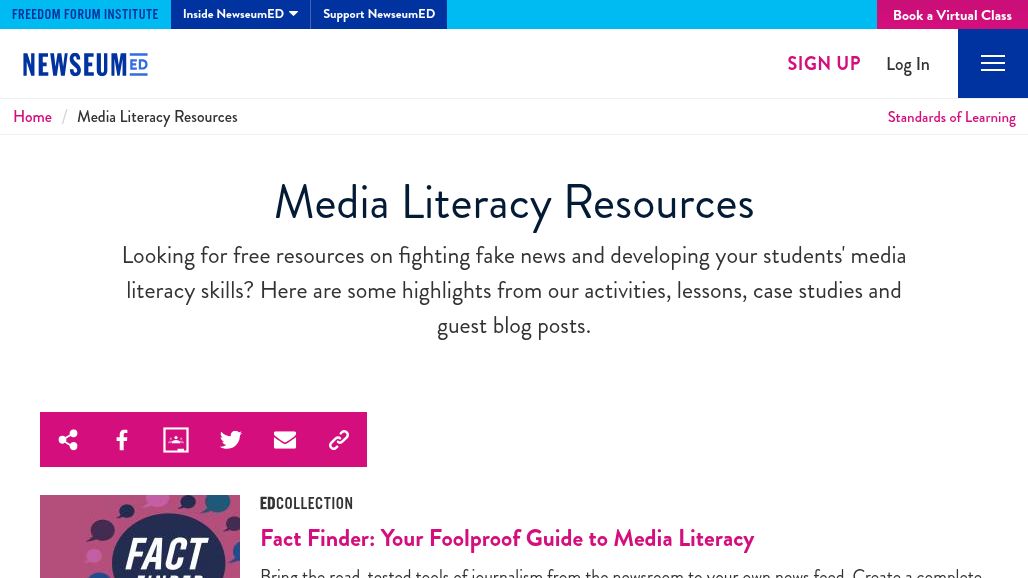
NewsuemED: Media Literacy Resources
Looking for free resources on fighting fake news and developing your students' media literacy skills? Here are some highlights from our activities, lessons, case studies and guest blog… learn more
No websites match your current filters
– no items filtered –
